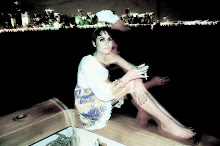Of course, I've been thinking about everything, which isn't to say much of much at all. But in my falling tonight - falling, again or rather back, in love with Manhattan I listened/learned lives of others and wrote few words and said many more that meant much within my mind - all of which, I wait until tomorrow or the day after or the month after that to finally write or process, yes all I want is to stop and process these days, these months, these months that keep me breathing and yet make me breathless. How trite, yes, I agree. I hate the sentimentality. It makes me feel awkward, pathetic, artificial, naive, dumb. But I did begin writing this in a half-consciousness, strung out on the couch, watching interviews with respectable women who won't stop speaking about their weight, and the food, and how they control it, and how this and that and the other... AND OMG... ENOUGH ALREADY... yes, already, enough, and then I began looking through albums and it made me stop, here, right where I lay, before writing this, and think, think, acknowledge and admit, that finally, for the very first time, I have become someone, some female who I haven't been since 4th grade. I eat what I want. I can't remember the last time I had a salad or went to the gym... and though I want these things... I haven't rushed toward them and yes, I'd like to see it become otherwise, so I can be healthy and strong (exercise helps me escape interior repetition) I don't hate what has become of me. And I would never tell anyone, ever, that they should limit that which they indulged in as a child. I would never tell an audience nor write a "best-seller" exposing the "secrets" to becoming skinny. Very simple, eat steamed green vegetables, grapefruit and papaya morning until night. And be prepared not to live your life at all - well, you will live it but not in the company of anyone who lives sensibly nor who I respect (I may empathize, yes I hope I can) but such obsessions aren't admirable... and aren't we all, please, just looking for some other to teach us something and also, be that other who teaches some self how to truly be?
Tonight I discussed a novel - a story - that has been "brewing"...
Tonight were hours I felt.




















 ver wonder what your therapist is really thinking? In ''The Impossibility of Sex,'' the London psychotherapist Susie Orbach describes the impressions that go through her mind during treatment sessions; she gives a human face to the stereotyped portrait of the distant, passive analyst by showing that, on the contrary, she is deeply affected by her patients. She details the therapeutic process through seven composite patients drawn from her 20 years of practice, among them a seductive male chef, a self-mutilating businesswoman and a lesbian couple. She dissects these clinical ''stories'' to let the reader in on her thoughts at significant points along the way, admitting with impressive candor to feelings of sexual attraction, arrogance, favoritism and even failure. Orbach believes that patterns of interaction between therapist and client often recapitulate aspects of the client's early painful experiences and are thus the key to healing. Her physical and emotional responses to those who come to her for help supply information that propels the clinical process forward. Orbach, the author of ''Fat Is a Feminist Issue,'' has a knack for making psychological material accessible and engrossing. The fact that the patients and their circumstances are fictionalized -- albeit for reasons of confidentiality -- dilutes somewhat the power of these ''case studies,'' and the titillating and misleading title cheapens Orbach's intent. The prevailing theme of this artful book is not the impossibility of sex, but rather the possibility of transcending violation and loneliness.
ver wonder what your therapist is really thinking? In ''The Impossibility of Sex,'' the London psychotherapist Susie Orbach describes the impressions that go through her mind during treatment sessions; she gives a human face to the stereotyped portrait of the distant, passive analyst by showing that, on the contrary, she is deeply affected by her patients. She details the therapeutic process through seven composite patients drawn from her 20 years of practice, among them a seductive male chef, a self-mutilating businesswoman and a lesbian couple. She dissects these clinical ''stories'' to let the reader in on her thoughts at significant points along the way, admitting with impressive candor to feelings of sexual attraction, arrogance, favoritism and even failure. Orbach believes that patterns of interaction between therapist and client often recapitulate aspects of the client's early painful experiences and are thus the key to healing. Her physical and emotional responses to those who come to her for help supply information that propels the clinical process forward. Orbach, the author of ''Fat Is a Feminist Issue,'' has a knack for making psychological material accessible and engrossing. The fact that the patients and their circumstances are fictionalized -- albeit for reasons of confidentiality -- dilutes somewhat the power of these ''case studies,'' and the titillating and misleading title cheapens Orbach's intent. The prevailing theme of this artful book is not the impossibility of sex, but rather the possibility of transcending violation and loneliness. 












